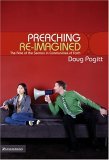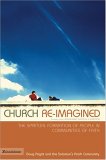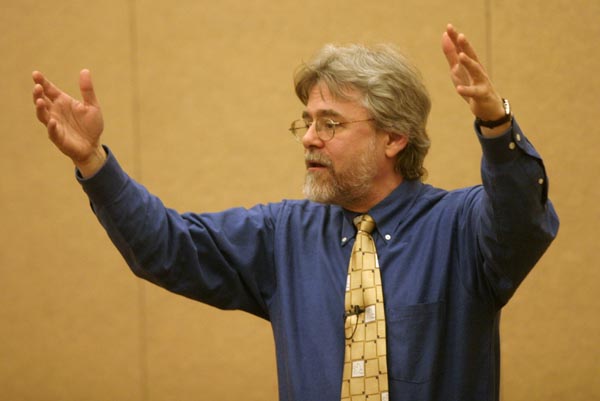Doug Pagitt
For what it is worth, Doug grabbed off the book table and waved around the recent work by Eddie Gibbs & Ryan Bolger, Emerging Churches: Creating Christian Community in Postmodern Culture (Baker; $19.99) which he assured us is the best introductory volume to read (he's correct, I think, for any number of good reasons.) He also promoted The Church in Transition: The Journey of Existing Churches into Emerging Culture by his buddy Tim Conder, with a forward by Dan Allender. (Zondervan $15.99.) It looks like a real "bridge-building" book and one that we will want to promote here.
But yesterday, in this conversation in the round, there were few young folk there, hardly any body piercings (or even anyone complaining about the very bad coffee); nobody seemed too fluent in how film studies can shape church life, seemed too interested in counter-cultural voices for fair trade, say, or noting how Walsh & Middleton use Foucalt to do their study of Colossians---you know, the tone in a gathering that seems, to illustrate pomo sensibilities. Older mystics like Russell and his Center for Spiritual Formation folks and fairly ordinary smaller-town pastors and members, though, all wanted to hear what this free-range, post-evangelical with a church called Solomon's Porch had to say. From their fairly ordinary middle-class settings, it seemed, they were very, very interested and engaged in good, pastoral questions. Thank goodness that ordinary churches have good-hearted folk who are willing to stretch into new arenas of mission and buy a few books on new stuff.
Paggitt made it clear, happily, that he (nor most others who have planted postmodern community churches) do not want to set forth a grand plan for others. They were just following their noses, creating a space---granted, an artsy place that sounds more like an organic coffeehouse than a typical church---where Christian faith seemed plausible. Straight-rowed pews with authoritarian lectures called sermons organized around majority-rule business meetings just didn't seem to be able to cut it with Pagitt; it didn't make sense and it didn't seem all that Christian; he and his companions felt compelled to try to new ways of being faithful to the spirit of Christ. Holy-moly, it was interesting; he has read up on quantum physics and network theory, talked about his multi-racial family, and my hunch is he has checked out the best deconstructive literary critics. Whether he has or hasn't, I have rarely been around anyone who so naturally breathed the good insights of cultural studies and who so regularly asked the big questions---what does it say to have the pews all in a row, facing one direction. Facing one direction for crying out loud! I don't know what my Russian Orthodox friends would say, and one Pentecostal pastor there was revved up, but I am sure that standard denominational folks, the proverbial person in the pew (ha!) wouldn't quit get how he could get all worked up and speak theologically for so long about such a simple architectural feature. Educational wings for our buildings? Calling the worship gathering a service? Don't even get him started.
I could go on and on telling of the interesting and important and fruity things he said. And I could nearly cry about the things that went unsaid. I remain pretty vexed by the whole movement (as I wrote back on our monthly review when I first reviewed an early batch of books that branded this emergent name.) Still, for a good-hearted effort at doing church in a way that makes sense in this context, and which tries to capture the New Testament struggle--the old way of Jewish exclusion doesn't seem right, according to the Spirit as the story is told in Acts, and others get to get in on the good news, now, too!---and develop a set of practices that open up folk to live into 21st century questions in light of this grand Story, well, it is pretty exciting.
Here's the skinny on Doug Pagitt's three books. The new little prayer book, Body Prayer: The Posture of Intimacy with God ($15.99), speaks volumes about his anti-Gnostic and non-dualistic spirituality. With a couple of good mediations and poetic prayerful notes, it really is a guide to different body postures that themselves become prayer. Complete with little line-drawing sketches. We love it.

His hardback one on participatory preaching, Preaching Re-imagined ($18.99) makes most sense when you feel how deeply he believes that every person counts and that spiritual formation should be communal and dialogical. No hogging the center stage (for The Porch that would be a stool in the round) for him---sermons are created in community and are delivered in a multi-voiced, dialogical, free-form way. His first book, now retitled, Church Re-Imagined ($16.99) lays out an example of emergent thinking by showing a typical--typical?---week at Solomon's Porch.

We have some of these last two left over (I almost always over-order for author appearances, not wanting to let anyone down.) We need clear out a few of these, rather than send 'em back. Here is my blog-special, good for all of the month of March (or until supplies run out.)
2 for $20
That is $7 off the paperback and $9 off the hardcover.





<< Home